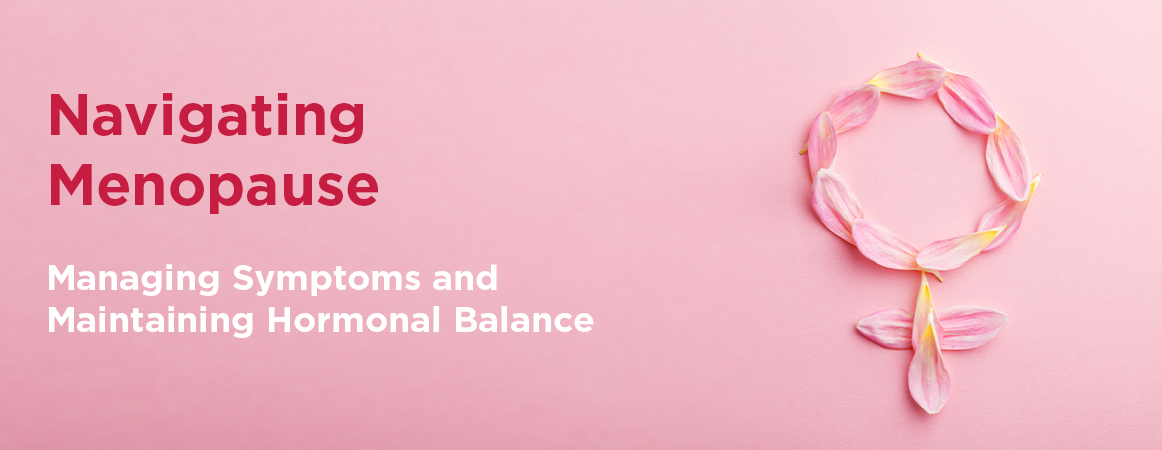Navigating Menopause: Managing Symptoms and Maintaining Hormonal Balance
Menopause is a normal stage in a woman’s life that signifies the end of her reproductive years. While it is a normal transition, it can bring about various physical and emotional changes due to hormonal fluctuations. Understanding how to manage the symptoms and maintain hormonal balance during this time is crucial for women’s overall well-being. In this blog, we will explore the different aspects of menopause, including its symptoms, causes, and effective strategies for symptom management and hormonal balance.
At MMI Hospital, you will find a team of highly accomplished gynecologists in Karachi who rank among the best in the field. Should you encounter any signs or symptoms of menopause, rest assured that you can receive exceptional care from the top gynecologists in Karachi at MMI.
What is Menopause?
Menopause is defined as the absence of menstrual cycles for at least 12 months. It is a normal part of aging and typically occurs between the ages of 45 and 55Menopause is classified into three stages: perimenopause, menopause, and postmenopause.
During perimenopause, the ovaries gradually produce less estrogen and progesterone, leading to irregular menstrual cycles. Eventually, the ovaries stop releasing eggs, resulting in menopause. The hormonal changes during this time can cause various physical and emotional symptoms.
Common Symptoms of Menopause
1. Hot Flashes and Night Sweats
Hot flashes and night sweats are one of the most well-known and common symptoms of menopause. These sudden feelings of intense heat can cause excessive sweating and discomfort, often disrupting sleep and daily activities.
2. Vaginal Dryness and Discomfort
As estrogen levels decline, many women experience vaginal dryness, itching, and discomfort. These symptoms can lead to pain during intercourse, urinary issues, and an increased risk of vaginal infections.
3. Mood Changes and Sleep Disturbances
Menopause can also impact a woman’s emotional well-being, leading to mood swings, irritability, anxiety, and even depression. Sleep disturbances, such as insomnia or disrupted sleep patterns, are also prevalent during this time.
4. Bone Health and Osteoporosis
Estrogen is essential for bone density maintenance. As estrogen levels decrease during menopause, women become more susceptible to bone loss and osteoporosis, a condition characterized by weak and brittle bones.
Managing Menopausal Symptoms
1. Lifestyle Modifications
Making certain lifestyle changes can help alleviate menopausal symptoms. Regular exercise, a healthy diet rich in calcium and vitamin D, and stress-reduction techniques like yoga or meditation can contribute to overall well-being during menopause.
2. Hormone Replacement Therapy (HRT)
Hormone replacement therapy involves the use of medications that contain estrogen and progesterone to help alleviate menopausal symptoms. HRT can be highly effective but should be used under the guidance of a healthcare professional at the best gynecologist hospital in Karachi. MMI Hospital offers exceptional gynecological services of the highest quality.
3. Non-Hormonal Treatments
For women who cannot or prefer not to undergo hormone replacement therapy, there are non-hormonal treatment options available. These include selective serotonin reuptake inhibitors (SSRIs), certain blood pressure medications, and herbal supplements like black cohosh and soy.
Maintaining Hormonal Balance
1. Balanced Diet and Supplements
Eating a well-balanced diet that includes foods rich in phytoestrogens, such as soy, flaxseeds, and legumes, can help maintain hormonal balance. Certain supplements like omega-3 fatty acids, vitamin D, and calcium may also be beneficial.
2. Stress Management
Chronic stress can disrupt hormonal balance. Engaging in stress management techniques, such as regular exercise, meditation, deep breathing exercises, and seeking support from friends and family, can help reduce stress levels and promote hormonal equilibrium.
3. Regular Check-ups and Communication with a Healthcare Provider
Regular check-ups with a healthcare provider, such as a gynecologist, are essential during menopause. They can monitor your hormonal levels, address any concerns or symptoms, and guide you in managing hormonal balance effectively.
Conclusion
Menopause is a natural phase of a woman’s life that brings about hormonal changes and various symptoms. By understanding these symptoms and implementing effective strategies for symptom management and maintaining hormonal balance, women can navigate this transition with greater ease.
Whether through lifestyle modifications, hormone replacement therapy, non-hormonal treatments, or maintaining a healthy diet and stress management techniques, women can embrace menopause as a time of growth and empowerment. Consulting with a gynecologist specialist in Karachi is crucial for personalized guidance and support throughout this transformative journey.


